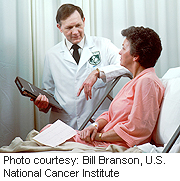
WEDNESDAY, Oct. 24 (HealthDay News) — Many people with incurable cancer mistakenly believe chemotherapy may save them, a new study finds.
Researchers at Dana-Farber Cancer Institute in Boston found that more than 80 percent of people with advanced colon cancer and nearly 70 percent with advanced lung cancer thought chemo could cure their disease. In reality, chemo might give them several more months of life or ease troubling symptoms, but it rarely offers a cure for these diseases once they’ve spread to distant sites in the body.
“It’s really easy for people to have expectations that aren’t well aligned with reality,” said the study’s senior author, Dr. Deborah Schrag, an attending physician in adult oncology at Dana-Farber. “They want to be the one to beat the cancer. And, doctors want to be helpful. We want to be positive.
“What’s clear,” she added, “is that whatever we’re doing right now, we need to change.”
These misunderstandings may keep patients from making informed treatment decisions and preparing for death, say the study authors.
The study, published Oct. 25 in the New England Journal of Medicine, included almost 1,200 people who were part of the larger Cancer Care Outcomes Research and Surveillance study. The study volunteers were surveyed about four months after their diagnosis with advanced lung or colon cancer — cancer that had spread to other areas of their body (metastasized). Almost all were receiving chemotherapy.
Overall, 69 percent of the lung cancer patients and 81 percent with colon cancer reported unrealistic expectations about the likelihood that their chemotherapy might cure them.
People with colon cancer were more likely to believe that chemo might provide a cure, and blacks and Hispanics were significantly more likely to think that.
Patients who reported having favorable communication with their doctor were also more likely than others to expect a cure, the investigators found.
“You’ve been dealt a bad hand and, as your doctors, we want to help you cope,” said Schrag. “But we may be robbing people of the opportunity to prioritize and make plans for what’s important to them. We need to walk a fine line and have our patients hope for what’s possible, but plan for what’s probable.”
Doctors also have to expect their popularity may drop in the face of truthful conversations, the study authors noted.
The co-author of an accompanying editorial, Dr. Thomas J. Smith, said what really matters is what people understand about their disease. “As long as these people are still planning for the worst, it’s wonderful if they can be hoping for the best,” he said.
Smith, director of palliative medicine at Johns Hopkins Sidney Kimmel Comprehensive Cancer Center, said that oncologists often need to change the way they deliver information to help people better understand what they can expect to happen.
“Oncologists like me are pretty good at saying to someone with lung cancer, ‘This is something we can’t cure.’ But, that’s very different than saying, ‘What do you want to know about your disease?’ or ‘What do you understand about your disease?'” he said.
Smith said it’s also important to have these types of discussions several times during the illness, and when someone has between three and six months left to live, it’s important to discuss hospice care.
Misguided expectations also burden taxpayers. One-quarter of Medicare funds — the U.S. insurance program for the elderly — are spent in the year before death, in part because of late-stage chemotherapy, the editorialists noted.
“Chemotherapy can help ease symptoms, and some chemotherapy may extend life, but at some point chemotherapy can do you more harm than good,” Smith said.
Schrage added, “It’s important to know that chemotherapy is helpful and valuable. It’s not worthless by any means. But, hopefully patients will feel empowered to ask, ‘How will this help me?’ and ‘What is realistic for me to expect?'”
She said it’s also very helpful to bring someone to your doctor’s appointment, because it’s often hard to focus on what the doctor is saying after you’ve been given difficult, life-altering news.
More information
There’s more on chemotherapy at the American Cancer Society.

